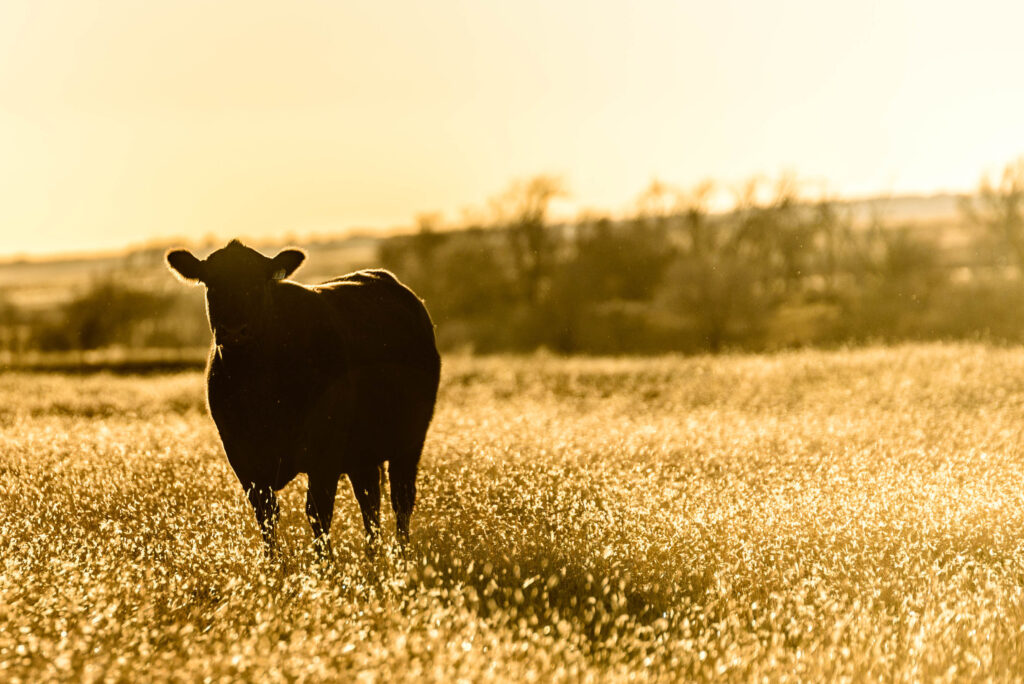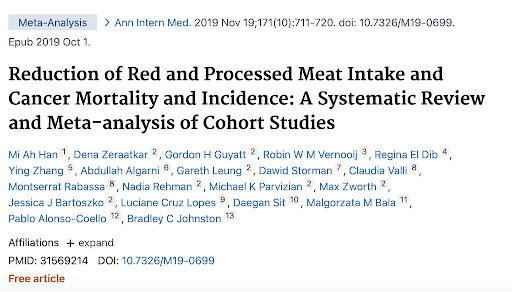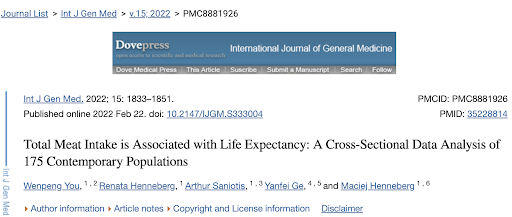
Hey Radical Health Seekers 👋
This week in your Radical Health Newsletter we’re coming to the defense of beef…
And arming you with scientific evidence to dispel the most common arguments people throw its way.
We believe beef is one of the best things you can eat for radical health…
Because not only is it incredibly nutritious…
But it’s also accessible, affordable and delicious.
Yet many people have concerns about eating beef…
Because for decades now, we’ve been told that if it isn’t killing us, it’s killing the planet.
But are those beliefs based on unbiased scientific evidence?
No.
Because in science, money talks.
For example, this paper from 2022 found that 95% of the committee members for the newest USDA Dietary Guidelines had conflicts of interest with the food and pharmaceutical industries…
And somehow, top nutrition researchers now deem it fit to rank Frosted Mini-Wheats above REAL foods like ground beef:
Look, money clearly talks.
And big food companies fund a ton of nutritional research in order to skew the results in their favor…
So that their products can then be promoted as the healthiest option despite being anything but.
Consequently, most people don’t know who to trust for nutrition advice, and their health suffers…
The food companies continue to make bank…
And ACTUAL food is demonized.
Now of all the demonized foods, beef is probably top of the pile…
But humans have been eating beef (or it’s equivalent) for millions of years.
Because throughout human history, we’ve favored meat (and organs) from the biggest, fattest grass-eating mammals we could find.
And the closest modern-day equivalent that is widely available is beef.
Meat made us human.
“But doesn’t beef increase my risk of heart disease and other chronic diseases?”
We all have an ‘Uncle Joe’ or ‘Aunt Marge’ who had a stroke or heart attack…
And we bet most of your family believed it was because of all the saturated fat in the steaks they were eating…
Mainstream authorities like the American Heart Association and the USDA STILL recommend limiting beef intake because of its saturated fat content…Even though we now have many studies confirming that saturated fat is NOT associated with heart disease and other chronic diseases (1, 2, 3, 4).

This 2020 study concluded that unprocessed red meat is not associated with heart disease:
“There is no robust evidence that current population-wide arbitrary upper limits on saturated fat consumption in the United States will prevent CVD or reduce mortality.”
“But beef does cause cancer, right?”
For decades, mainstream nutritional wisdom has said so, but this advice emerged from epidemiological studies showing correlation, not causation…
And the studies also frequently fail to correct for unhealthy user bias (e.g. those that eat red meat also might eat unprocessed foods and drink alcohol).
Plus, we now have newer, higher-quality review studies that indicate otherwise, like this study from 2019:

It’s one of the most comprehensive to date, which looked at data from 48 studies with over 5.7 million participants…
And concluded that the recommendations to limit red meat intake based on cancer concerns were bogus (you can read what they say here).
And there’s this 2019 study:

Which concludes:
“The possible absolute effects of red and processed meat consumption on cancer mortality and incidence are very small, and the certainty of evidence is low to very low”
“Ok, ok, but what about all the studies that show vegetarians live longer?”
This is another example of “if you repeat a lie often enough, people will believe it”…
But it’s a belief based on more bogus science, with more weak correlations that fail to correct for healthy user bias.
For example, many of the studies showing positive correlations between vegetarians and lifespan fail to correct for the fact that health-conscious vegetarians often avoid alcohol and ultra-processed foods too…
So which factor is responsible for their long life? The lack of meat or the lack of junk food?
And we now have evidence to indicate the opposite, like this recent study:

Here, the authors conclude that the more meat people eat, the longer they live!
And then there’s the fact that Hong Kong has the highest meat consumption per capita AND highest life expectancy per capita combined (yes it’s true, Google it)…
It may be a correlation, but it sure flies in the face of the belief that you must eat less ground beef if you want to live a long life.
“Yeah, yeah, ok I’m now convinced beef won’t kill me…
But won’t beef kill the planet? 😦🌎 ”
Of all the arguments floated against eating beef, the climate change argument is certainly having its moment…
And we’re now supposed to believe that to be a responsible citizen, we should skip the beef and eat beans or Beyond Burgers instead.
But there are SO many issues with this.
Firstly, beef is one of the most nutritious foods on the planet.
So any decision to swap real beef with fake beef must consider the negative impacts on human health.

This study did just that.
It examined eliminating all animal foods from the American diet and found that emissions would only be reduced by 2.6%…
Yet found that nutrient deficiencies would increase, and total calories would increase.
This isn’t desirable when most people are already overweight or obese and simultaneously suffering from nutrient deficiencies!
And then consider the fact that there have always been methane-burping ruminants in North America…
(as many as 60 million bison in the 1800s)
And that according to our own EPA, beef production is only responsible for 1.9% of total emissions in 2016:

Or what about the fact that when properly raised (in a regenerative fashion), cattle can be a net positive…
Because they help put carbon back into the soil, and regenerate land previously degraded from monocrop agriculture.
Now we aren’t saying beef production has no environmental impact…
But circling back to the issue of biased research, and money talking…
You’ll have to forgive us if we approach the subject with skepticism.
And you don’t need to agree with our defense of beef…
But we hope we’ve encouraged you to ask some questions…
And that the information we’ve provided you with today helps you on your journey to radical health.
Speaking of which, we’ve just about enough space left to meet our.
Radical Health Hero Of The Week 👊

This is Diane and she is absolutely crushing it on an animal-based diet!
Here’s what she told us:
“On the left is when I first started. On the right is now 2 years later.
I wasn’t just doing this because of my weight.
My weight gain was just an unfortunate side effect of stress, hypothyroidism, Hashimoto’s, depression and I can go on… It took a lot of trial and error.
The best decision I ever made was to take charge of my own health. 🥰 ”
We are STOKED for Diane’s success! 🙌
And if you have an incredible story like Diane’s, please share it with us!
If we feature it in the newsletter, we’ll send you a free bottle of your favorite Heart & Soil supplement in appreciation 🙌🏼
>> Go here to share your story
That’s all from us this weekend 👋🏼
Stay Radical!
The Heart & Soil Team
Subscribe to future articles like this:
